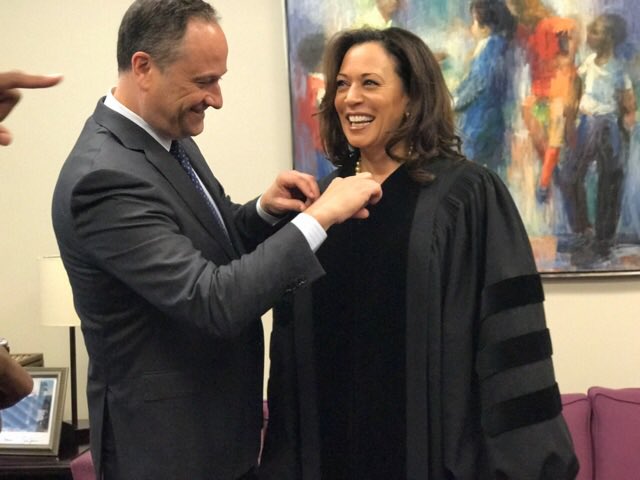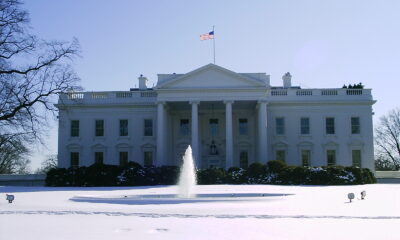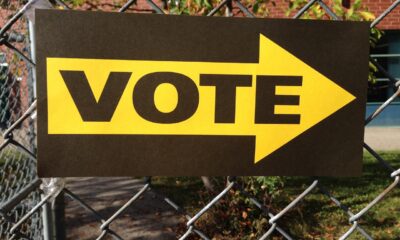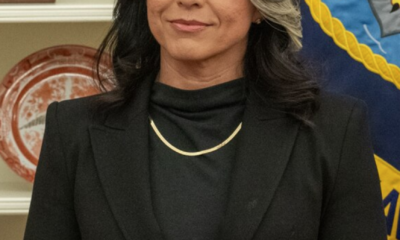Executive
Was Kamala Harris’ Nomination Democratic? Does It Matter?
The nomination of Kamala Harris was not democracy, but perhaps that shouldn’t be the goal anyway, if we listen to the Founders.

George Mason, one of America’s “Forgotten Founders,” insisted that “no free government” could be preserved except “by frequent recurrence to fundamental principles.”
How Kamala Harris got her nomination
This Constitution Day provides a prime opportunity for such a recurrence, coming as it does amid a wild election year.
It seems like all our October surprises are coming early this year. On June 27, President Joe Biden’s historically bad debate performance sparked panic in his party. On July 21, Biden announced he was stepping down and throwing his support behind Vice President Kamala Harris. By Aug. 2, Harris had secured enough delegate support to ensure her candidacy for the Democratic Party without winning a single primary vote.
Two reasons for concern
Prominent Republicans immediately called foul. Stephen Miller, a former aide under President Trump, posted: “Democrats just cancelled democracy.” J.D. Vance, Trump’s newly-minted candidate for Vice President, called the switcharoo “anti-democratic.”
Democrats responded to these charges primarily by deflecting and hurling counter-accusations at the GOP. Writers for the L.A. Times, the Boston Globe, and Slate, as well as Michigan Gov. Gretchen Whitmer, gave virtually the same response: the GOP has some crust, seeing as how Trump is a much greater subverter of democracy! Which, of course, is no answer at all.
Once the white-hot passions of this election season simmer down, we would do well to consider this debate by returning to authentic principles of American democracy.
Two troubling assumptions emerged from this dispute. First, both sides seemed to assume that the best democracy means the purest democracy, which is a spurious principle. Second, prominent Democrats said the quiet part out loud in this debate: the existing nominating process was a sham democracy from the start, and nobody seems to care.
Pure Democracy?
When George Mason arrived at the Constitutional Convention in 1787, he worried that a series of insurrections in Massachusetts, known as Shays’ Rebellion, had led many Americans into anti-democratic sentiments. He was therefore relieved to find at the Convention, so “many men of fine republican principles.”
But neither Mason nor the other Framers believed that the best form of popular government was the purest form of democracy.
James Madison – in a convention speech that foreshadowed his famous essay in Federalist No.10 – reminded his fellow delegates: “In all cases where a majority are united by a common interest or passion, the rights of the minority are in danger.” Elsewhere, he decried the misapplied democratic principle that presumed “the interest of the majority is the political standard of right and wrong.” This simplistic understanding of democracy was no different from advocating that “force,” or the interest of the greater number, was “the measure of right.”
Like other Framers, Madison was in favor of combining direct democratic elections (to foster “the necessary sympathy” between the people and their representatives) with indirect selection (for “refining the popular appointments”).
The 2024 primary season seems to validate the Founders’ insight that a “more democratic” process does not always yield a better or even more popular choice. The democratic primary elections last spring ended in producing 25% “double-haters” – Americans who didn’t approve of either Trump or Biden. However, once Harris replaced Biden by less democratic means, the “double-haters” dropped to just 8%.
Sham Democracy
But the greater problem with the primary process was that it made a mockery of democracy.
Madison knew something about sham democracies in his own day. Shortly after the Constitution was ratified, he wrote: “In proportion as slavery prevails in a State, the Government, however democratic in name, must be aristocratic in fact.” He thought Virginia was especially guilty of this subterfuge. By denying suffrage to both its enslaved population and the poor, he estimated that only 25% of adult males in Virginia could exercise the franchise.
Madison had scant powers to remedy Virginia’s aristocracy. But to his credit, he led the (largely unsuccessful) charge to diminish the power of the slaveholding interests and to enlarge the power of the poor in Virginia’s 1829-1830 constitutional convention.
In 2024, many Democrats likewise recognized that their primary system was undemocratic, but only when they found it convenient to discard it for an even less democratic process.
President Biden initially defended his refusal to step aside by pointing to the “Democratic nomination process,” saying: “I received over 14 million votes.” After Biden reversed course, Speaker Mike Johnson repeated the charge, alleging that Democratic Party bosses had “steamrolled democracy” because they “invalidated” those votes.
But 14 million votes is less than 6% of all eligible voters in America. This figure makes eighteenth-century Virginia look like a bastion of democracy by comparison.
Belated acknowledgment
Democrats finally acknowledged this sham only when they sought to ignore the results. According to Susan Stokes: “The way that we are given candidates to choose among is not entirely democratic.” And Richard Morgan said it succinctly: “Everyone knows that there was no real primary this year.”
What would it look like to recur to fundamental principles in this instance? Maybe we should devise a process that better expresses majority will. Or maybe we should openly reject popular elections in the primaries in favor of “refining the popular appointments.”
But probably the worst choice is, first, to pretend that the best democracy is always the purest democracy, and, next, to pretend that a process that discovers the preferences of only 6% of eligible voters is sufficient to satisfy that standard.
Happy Constitution Day!
This article was originally published by RealClearPolitics and made available via RealClearWire.
Lynn Uzzell is Visiting Assistant Professor of Politics at Washington and Lee University. She specializes in the Constitutional Convention of 1787 and the political thought of James Madison.
-

 Accountability3 days ago
Accountability3 days agoWaste of the Day: Principal Bought Lobster with School Funds
-

 Civilization15 hours ago
Civilization15 hours agoWhy Europe Shouldn’t Be Upset at Trump’s Venezuelan Actions
-

 Executive2 days ago
Executive2 days agoHow Relaxed COVID-Era Rules Fueled Minnesota’s Biggest Scam
-

 Constitution3 days ago
Constitution3 days agoTrump, Canada, and the Constitutional Problem Beneath the Bridge
-

 Christianity Today15 hours ago
Christianity Today15 hours agoSurprising Revival: Gen Z Men & Highly Educated Lead Return to Religion
-

 Civilization2 days ago
Civilization2 days agoThe End of Purple States and Competitive Districts
-

 Executive1 day ago
Executive1 day agoWaste of the Day: Can You Hear Me Now?
-

 Civilization4 days ago
Civilization4 days agoThe Conundrum of President Donald J. Trump








